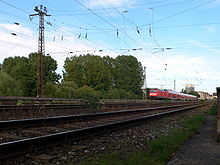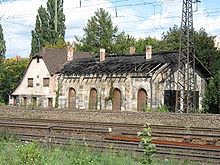- Nuremberg–Bamberg railway
-
Nürnberg Hbf – Bamberg Route number: 820, 891.2 Line number: 5900 Line length: 62,4 Gauge: 1435 Voltage: 15 kV, 16.7 Hz AC Maximum speed: 160 Legend

from Schwandorf (Nuremberg–Schwandorf line) S 1 

and Feucht (Nuremberg–Feucht line) S 2 

from Cheb (Nuremberg–Cheb line) 

from Regensburg Hbf (Nuremberg–Regensburg line) 

and Ingolstadt Hbf (Nuremberg–Munich HSL) 

0.0 Nürnberg Hbf terminus of S 1 S 2 S 3 (312 m) 

to Roth (Nuremberg–Roth line) S 3 

to Augsburg Hbf (Nuremberg–Augsburg line) 

to Crailsheim (Nuremberg–Crailsheim line) 

1.3 Nuremberg–Augsburg railway 

1.3 Nuremberg–Roth line 

Marshalling yard–main goods yard line 

2.1 Nürnberg Rothenburger Straße 

from Nuremberg goods yard 

3.2 Jansen bridge Nuremberg (junction) 

3.6 B 4R 

3.6 Nürnberg-Neusündersbühl (closed 10 Dec 2006) 

4.8 Ring railway (bridge demolished 11 September 2009) 

5.0 Ring railway from Nürnberg Nordost 

5.4 Nürnberg-Doos (closed 2 June 1991) 

Alignment since 1876 

5.7 A73 

6.1 from Nürnberg Nordost and Nuremberg marshalling yard (Ring railway) 

Bavarian Ludwig Railway 

Pegnitz 

7.6 Fürth (Bay) Hbf (297 m) 

8.2 Seven arch bridge over the Rednitz (186.7 m) 

to Cadolzburg (Rangau Railway) 

to Würzburg Hbf (Nuremberg–Würzburg line) 

Poppenreuth 

10.1 B8 

10.2 Fürth-Unterfarrnbach 

Neuronhof 

Ronhof 

12.1 Regnitz (176 m) 

14.5 Vach (290.3 m) 

15.6 A73 



16.8 Großgründlach (closed 2 June 1991) 

18.8 Eltersdorf 

19.4 A 3 

from Frauenaurach (Erlangen-Bruck–Herzogenaurach line) 

20.6 Erlangen-Bruck 

21.6 B 4 

22.3 Erlangen goods station 

from Gräfenberg (Erlangen-Gräfenberg line) 

23.5 Erlangen 

24.9 Burgberg tunnel (306.65 m) 

27.5 Bubenreuth 

31.0 Baiersdorf 

34.6 Kersbach 

36.8 from Höchstadt (Aisch) (Forchheim–Höchstadt line) 

37.2 from Ebermannstadt (Forchheim–Behringersmühle line) 

38.3 Forchheim (Oberfr) 

38.5 B470 

41.7 A73 

45.3 Eggolsheim 

48.5 Buttenheim 

51.2 Hirschaid 

from Schlüsselfeld (Strullendorf–Schlüsselfeld line) 

54.8 Strullendorf 

55.5 B505 

B22 

62.4 Bamberg 

to Scheßlitz (Bamberg–Scheßlitz line) 

to Würzburg Hbf (Bamberg–Würzburg line) 

to Hof Hbf (Bamberg–Hof line) The Nuremberg-Bamberg line is a German railway connecting the Bavarian city of Nuremberg with Bamberg via Fürth, Erlangen, Forchheim. It is part of the northern section of the Ludwig South-North Railway. It runs as one of the important German transport routes along the Regnitz Valley. Since German reunification the line has become important for long distance services. This is expected to increase once the Nuremberg–Erfurt high-speed line is opened.
Contents
History
After the Bavarian parliament had passed a bill for the construction of the Ludwig South-North Railway on 25 August 1843, work began on the line later in the year. The Royal Commission on Railway Construction of Nuremberg was responsible for the acquisition of land and its routing. The line was opened on 1 September 1844. The original route between Nuremberg and Erlangen, parallel to the Ludwig-Danube-Main Canal and east of Fürth was changed between 1862 and 1876 with the construction of the line to Würzburg and the so-called Furth arc. Until that time, the Ludwig South-North line the crossed the Ludwig Railway at the border of Nuremberg and Fürth.
Like all lines built in Bavaria at that time, the line was originally built as a single track line. It was duplicated between 1862 and 1892 in four stages. Electrification of the line was completed on 10 May 1939.
Opening dates
- 1 September 1844: Nuremberg–Fürth Kreuzung–Großgründlach–Bamberg
- 1 October 1862: Fürth Kreuzung–Fürth station
- 1 August 1876: Fürth station–Großgründlach
Route
 Regional-Express on the Siebenbogenbrücke in Fürth.
Regional-Express on the Siebenbogenbrücke in Fürth.
The route leaves the Nürnberg Hauptbahnhof together with the routes to Wurzburg, to Augsburg and to Crailsheim in the west, with the latter two branching off to the south or southwest, and the line to Bamberg and Wurzburg turning to the northwest and running parallel to the Frankenschnellweg (A73. It runs south of the suburbs of Gostenhof and Eberhardshof and the container terminal and the Nuremberg West depot, through the Rothenburger Strasse station and then crosses the border between Nuremberg and Fürth and the Frankenschnellweg and finally reaches Fürth Hauptbahnhof.
After the station, the line to Wurzburg forks off to the west and the Rangau Railway to the south. The route then crosses the Rednitz river on the Siebenbogenbrücke (Seven arch bridge) and turns in a long curve to the north and crosses the river now called the Regnitz south of Stadeln. Then, the route curves to the left between Stadeln and Herboldshof to Vach station, then passes to the east side of the Frankenschnellweg and continues to Eltersdorf and Erlangen. Before the line passes through Erlangen-Bruck station there is a junction with a branch line that used to go to Herzogenaurach, notable for the manufacture of sports shoes. After Erlangen station the line passes through the 306-metre Burgberg Tunnel and continues parallel to the Frankenschnellweg through Bubenreuth, Baiersdorf and Kersbach to Forchheim. At Forchheim station, a line branches off to Ebermannstadt (connecting to a steam railway operated by Dampfbahn Fränkische Schweiz) but another branch to Höchstadt closed in 2005.
Next, the line then crosses the Frankenschnellweg again and runs between it on the right and the Rhine–Main–Danube Canal on the left through Eggolsheim, Buttenheim and Hirschaid to Strullendorf station, where the line to Schlüsselfeld branches off. After the line crosses the Bundesstraße 505 it touches the southern foothills of the Hauptsmoorer national forest before running into Bamberg station.
Future
Building four tracks between Nuremberg and Fürth
A groundbreaking ceremony was held on 10 August 2006 for the building of two extra tracks between Nuremberg and Fürth to provide four tracks. This is a €162 million project related to the Nuremberg–Erfurt high-speed line project and the extension of the Nuremberg S-Bahn to Forchheim.[1] While the bulk of passenger traffic will continue to be carried on two tracks, a new track is necessary for freight traffic in order to create capacity for the S-Bahn. Four tracking of the line is due to be completed in late 2011.[2]
S-Bahn extension Nuremberg-Forchheim
As part of the expansion of the Nuremberg S-Bahn by 2010 the route to Forchheim is being integrated into the S-Bahn network. The project is linked with the Nuremberg–Erfurt high-speed line project and was originally due to be completed in 2000. However, construction between Nuremberg and Fürth did not begin until 2006.
Nuremberg–Ebensfeld upgrade for high-speed services
The route between Nuremberg and Ebensfeld is also being developed for speeds of up to 230 km/h, further reducing the journey from Munich to Berlin, which has already been significantly reduced by the opening of the Nuremberg–Munich high-speed line. €20 million is being spent to relieve conflicts between passenger and freight trains at the Fürth node. In addition a long freight tunnel, which will be several kilometres long, is planned to be built by 2017 under the Nuremberg and Fürth urban area.[1]
References
- ^ a b "Bahn-Schwerpunkt Nürnberg: DB investiert rund eine Milliarde Euro in neue Gleise und Anlagen] (DB invests around one billion euros in new track and equipment)" (in German) (Press release). Deutsche Bahn. 1 February 2008.
- ^ "Umsetzung von Projekten des Neubaus, Ausbaus und der Erhaltung der Bundesschienenwege in Bayern (Implementation of projects of the construction, expansion and maintenance of federal railway in Bavaria)" (in German) (PDF). Federal government's response to the written question by Anton Hofreiter, Bettina Herlitzius, Winfried Hermann and other Members and the Group of Alliance 90/The Greens). Deutscher Bundestag. 27 January 2009. http://dip21.bundestag.de/dip21/btd/16/117/1611730.pdf.
Categories:- Railway lines in Bavaria
- Transport in Nuremberg
Wikimedia Foundation. 2010.

